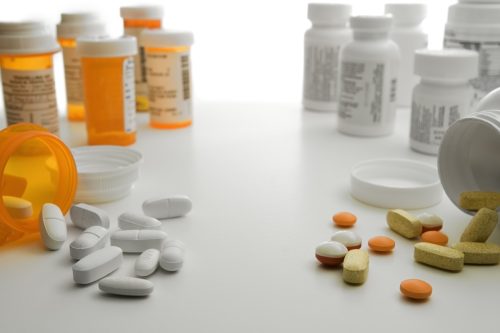CVS and Walgreens Just Put Purchase Limits on Several OTC Pain Meds

We’re already in the throes of the winter cold and flu season, and demand for medication has spiked accordingly. Over-the-counter (OTC) meds are particularly important when you’re not feeling well, helping to manage symptoms and reduce your fever. Unfortunately, certain OTC pain meds are in short supply this year, forcing drugstores like CVS and Walgreens to put purchase limits in place. Read on to find out which products you may have a harder time securing on your next trip to the drugstore.
READ THIS NEXT: Walgreens and CVS Are Closing Pharmacies and Cutting Back on Hours.
Multiple medications are on the FDA’s shortage list.

Medication shortages are commonplace this year, largely affecting prescription drugs.
On Dec. 16, the U.S. Food and Drug Administration (FDA) added two of Eli Lilly and Co’s diabetes treatments, Mounjaro and Trulicity, to the list of drugs currently in short supply, while Adderall, the drug used to treat attention-deficit/hyperactivity disorder (ADHD), has been officially facing a shortage since October.
An increase in respiratory syncytial virus (RSV) has further complicated the shortage situation, as amoxicillin oral solution is now on the FDA’s drug shortage list too. As an antibiotic, it doesn’t treat viruses, but amoxicillin does treat bacterial infections, which can easily develop in children who contract RSV or the flu.
To manage these viral conditions before they turn into something more serious, OTC meds are an invaluable resource. You don’t need a prescription to purchase them, and they can help keep symptoms in check when you’re sick and need to be resting. But certain OTC meds, particularly those for pain and fever reduction, will only be available in limited quantities at CVS and Walgreens.
Big-name brands are affected.

According to USA Today, the U.S. is currently seeing a shortage of children’s acetaminophen, which you may know by the brand name Tylenol, as well as ibuprofen, sold as Motrin and Advil. Generic forms of these treatments are also harder to come by, health experts told the outlet.
As a result, CVS has put a two-product purchase limit on all children’s OTC pain relief meds, both online and at brick-and-mortar pharmacies, per CNN. Walgreens, on the other hand, doesn’t have a limit when you shop in-store, but online, you can only purchase six OTC products.
Grocery stores are stepping in, too: Kroger is limiting customers to two pediatric pain relievers and four cold and flu items, a spokesperson told Reuters.
“Due to increased demand and various supplier challenges, over-the-counter pediatric fever reducing products are seeing constraint across the country,” Walgreens said in a statement provided to CNN. According to the retailer, the limits are intended to “help support availability and avoid excess purchases.”
CVS added that it has seen increased demand as well, noting that its limit is in place to “ensure equitable access,” per CNN.
RELATED: For more up-to-date information, sign up for our daily newsletter.
More sick children means more demand for these medications.

Experts say that shortages are a direct result of a higher number of reported illnesses and an early start to flu season. “There are more sick kids at this time of year than we have seen in the past couple years,” Shannon Dillon, MD, a pediatrician at Riley Children’s Health in Indianapolis, told USA Today.
Illustrating this, the Consumer Healthcare Products Association (CHPA) reported that sales of kids’ pain relievers are up nearly 65 percent compared to last year. The agency confirmed that these supplies are replenished as quickly as possible, and while there’s no “widespread shortage in the U.S.,” the issue still needs to be addressed.
“With demand for children’s pain and fever medicines reaching unprecedented levels following this early and severe flu season (along with cases of RSV and COVID), we understand why some retailers have adjusted to impose limits on purchases,” the group said in a statement to CNN. “While CHPA member companies are running manufacturing facilities 24-7 to meet demand, we will continue to encourage consumers to buy only what they need, so other families can find and purchase the medicines they are seeking.”
Here’s what to do if you can’t find the OTC meds that your child needs.

Unfortunately, we might see fewer supplies continue in early 2023, USA Today reported, meaning parents will need to take a different course of action if these pain relievers aren’t available. You can try natural remedies to treat different symptoms, and you can also let a fever run its course, doctors say.
“It’s OK to have a fever,” Summer Kerley, doctor of pharmacy and Rite Aid’s vice president of clinical and market access solutions, told USA Today. “A fever is our body’s way of saying, ‘hey, I’m trying to fight an infection.'”
However, if your child is under two months and has a fever over 100.4 degrees, they should see a doctor, and you should be monitoring behavioral changes for children of any age with a fever.
At the end of the day, it’s a good idea to reach out to a medical professional. While drugstores are seeing increased demand, the CHPA advises concerned parents “contact their pediatrician or other healthcare provider for additional guidance, especially when it comes to an appropriate amount of medicine needed to get them through this flu season,” per CNN.
Best Life offers the most up-to-date information from top experts, new research, and health agencies, but our content is not meant to be a substitute for professional guidance. When it comes to the medication you’re taking or any other health questions you have, always consult your healthcare provider directly.